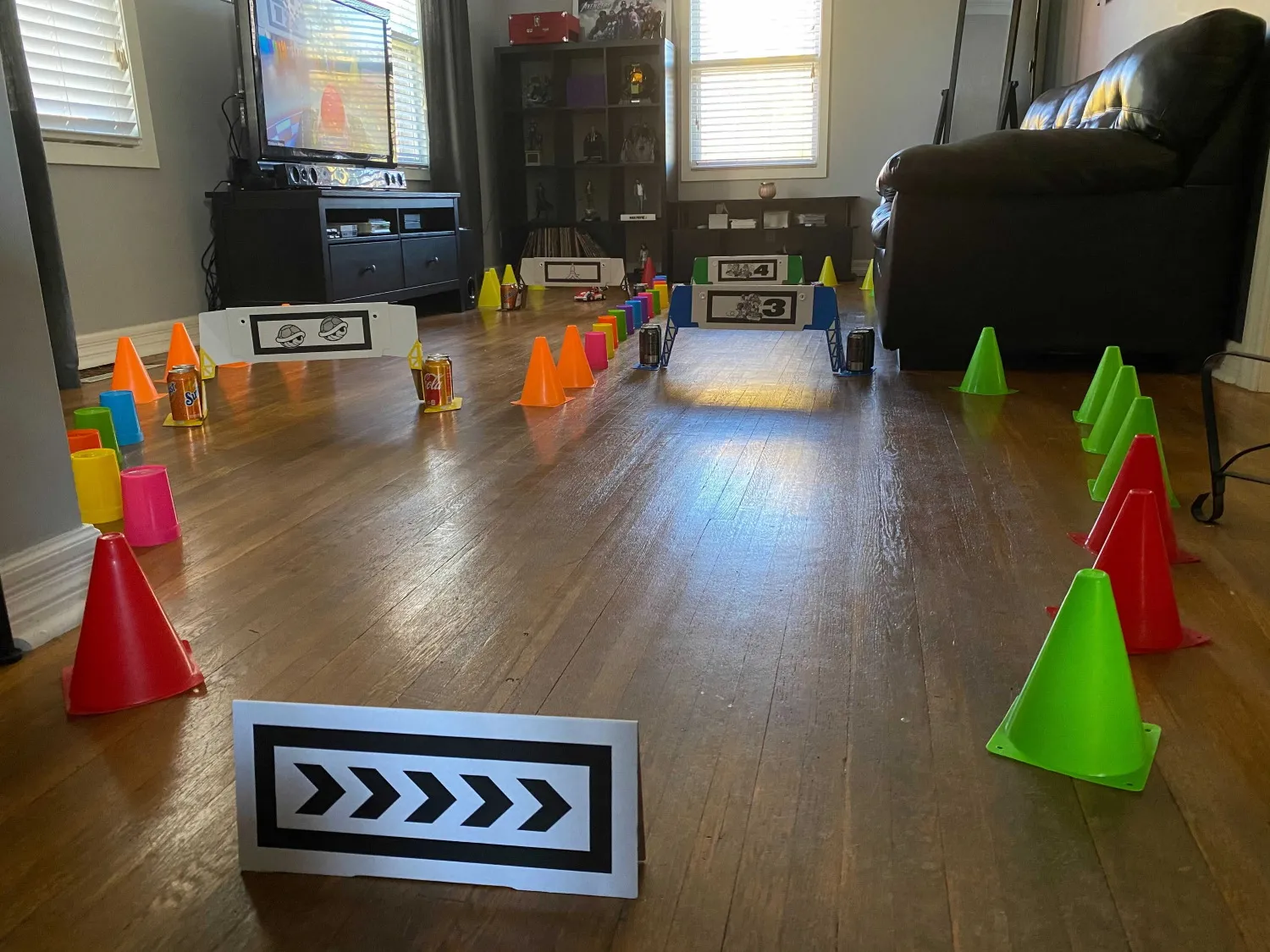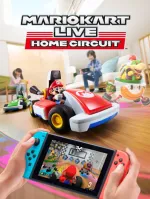
Mario Kart Live: Home Circuit Review
Since its debut on the SNES, the Mario Kart series has been one of Nintendo’s most consistently fun franchises. Mario Kart Live: Home Circuit invites you to bring the action into the real world, using your Switch and a physical remote-controlled car with a camera to bridge the gap between reality and your screen. The concept of configuring your room as a racetrack and speeding through it as Mario is an exciting prospect, and while it’s often novel and enjoyable, a few noteworthy speedbumps prevent it from taking home the gold trophy.
Mario Kart Live gives you one go-kart (featuring either Mario or Luigi), four gates, and two arrow signboards in the box. Using these pieces, you can build whatever course you can fit in the space you have. You can customize each gate onscreen with unlockable elements, including item blocks, boosts, piranha plants that grab you, and chain chomps that pull you in random directions. Once your gates are laid out and customized, you draw the road by steering your kart through the gates to paint the track. Then it’s off to the races against A.I.-controlled Bowser Jr. and the Koopalings.
Once you’re in a race, the mixed-reality experience works remarkably well most of the time, and it kept me entertained. I dodged goombas while drifting into a sharp turn by my coat rack, then blasted an enemy with a red shell. However, the virtual track sometimes doesn’t overlay the floor perfectly. This issue played tricks on my eyes and made me think turns were sooner than they were, and on rare occasions, a gate didn’t recognize that I passed through it.
I often ran into the sides of gates, which distorts the track; your option is to either deal with the changing conditions or pause mid-race to fix them. The game recommends you lay something heavy on each foot to keep it in place, but unless you happen to have a bunch of compact, heavy objects (I used 16 soda cans, two on each gate foot), this is something you have to put up with or compensate for when you design your stages. This frustration is further accentuated by in-game items and environments that are designed to push you off course; the sandstorm environment is neat because it blows the physical kart all over the place, but it also caused me to run into a gate more than a couple of times.
To get started, I had to make significant adjustments to my living room, moving the coffee table against the wall and rolling up my rug because it was too thick for the kart’s wheels. To have any sort of creative freedom, you need a sizeable open area, which could make this difficult for people in smaller houses or apartments to enjoy. Even in my relatively open main floor, I struggled to come up with ideas that would fit within the space. After moving to my more-open basement, I could flex my creative muscles a bit more, but the carpet slowed the kart down enough that I quickly returned to the hardwood surface of my living room.
I enjoyed wracking my brain to come up with clever configurations for my space. From a straightforward oval-shaped track and a figure-8 to a course with a long straightaway and a tight turn that weaved under my dining room table, I had fun getting creative within a space I was already familiar with. I loved taking a step back and looking at my living room in new ways to figure out how else I could expand the course. However, since a standard race lasted just around a minute with the space I was playing in, even my favorite designs got old before long.
Driving around your room delivers the standard Mario Kart feel, even if the backdrop is your real-life house. Blasting through your rivals while you’re powered up with a star is just as exciting as it is in the mainline series, and getting taken out by a blue shell in the final lap is just as infuriating. However, with a smaller stable of powerups and shorter, less varied courses to race through, the experience grows stale faster.
Time trials and custom races are amusing, but I spent most of my time in the three-race Grand Prix. You can reconfigure your track between each event, but with the mode applying distinct effects for each race, I didn’t feel compelled to go through the lengthy process of redrawing the track each time. Grand Prix is great for collecting coins to spend on cosmetic customizations for Mario/Luigi and the kart, but it’s even better for unlocking faster speeds and new environments to apply to custom courses; once I got the zippy 150cc and 200cc, I couldn’t imagine heading back to anything slower.
Despite its shortcomings, Mario Kart Live: Home Circuit still brings hours of fun. While firing up Mario Kart 8 Deluxe is more convenient and fully featured, Mario Kart Live’s unique take on the series is worth checking out for those looking for exciting twists on a well-worn concept.





Get the Game Informer Print Edition!
Explore your favorite games in premium print format, delivered to your door.
- 10 issues per year
- Only $4.80 per issue
- Full digital magazine archive access
- Since 1991










